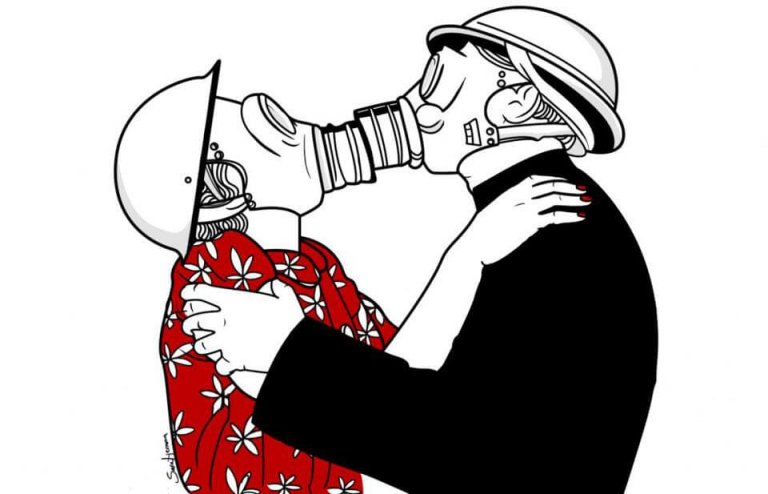Published : 14 marzo, 2017 22:27
Last update: 28 julio, 2022 21:51
If you have ever been fully submerged in the voracious swirl of a toxic relationship, surely you will understand what we are about to share in this article. First of all, we will try to define what a toxic relationship is and what it implies in the lives of those who suffer through it.
Of course, toxic relationships do not only concern romantic relationships . These can be relationships we maintain with a family member or a friend, as well. But in this article, we are going to establish limits for the topic and narrow them down to toxic relationships of the romantic kind.
“Know how to win without losing yourself and know how to lose by winning yourself”
A toxic relationship always has something that “makes up for it” for us
It’s that type of union which we maintain with someone and from which we are not capable of escaping. It is a union that is very strong, intense and destructive at the same time. We lose ourselves in it. And we become someone we are not. We seek to remain in it, even when this implies suffering most of the damage. Or, even worse, even if it implies the loss of our self-love .
Logically, if we are involved in that relationship, it is because there is a big benefit. Or at the very least, it contains something we are not ready to give up yet. A benefit powerful enough to prevent the breaking of the relationship. However, if we were capable of looking at it from a perspective which allowed us to behold the overall picture, we would be able to conclude something important. The toxicity this relationship is exerting on our lives merits for us to modify the relationship or end it.
Behind this type of relationship lies the same mechanism which sustains addictions. That’s why it is so difficult to escape from it. And the more time of our lives we invest into it, the harder it becomes for us to get out of it. We might not be able to see it now, but it is possible and gratifying to get out of it. It’s just like quitting smoking or ending a cocaine addiction.
I can also recover my lost responsibility and act accordingly
In general, we tend to place the blame on our significant other. “He is the toxic one”, “She is the toxic one, not me”, “I have given him too many opportunities, and he is incapable of changing. I do not know what else to do ”. There might not be anything left to do…maybe the healthiest, most beneficial and loving option for yourself is to end the relationship. Do not insist in reviving a relationship that does not have a pulse anymore. A heart that is no longer sending oxygenated blood.
Popular wisdom says: “Don’t ask for the impossible” . We can’t ask someone to be someone they are not. Enough time has passed for us to know that by now. How much of our lives do we have to lose on this effort, which is harmful to our mental and emotional health?! How many opportunities do you have to give in order for you to learn?! “Maybe I should wait a little more, he needs more time…”
And along the way, we separate from ourselves. We lose ourselves. We stop loving ourselves. Essentially, we are offering our lives to this kind of parenthesis in which the other person undoes his knots. Until he finishes, we don’t give up or give in. And what about what we deserve? What about our needs?
Getting out of a toxic relationship requires a monumental effort
This is why getting out of a relationship of this caliber is a superhuman feat. First of all, because we realize that we do not have any power over the other person (a really common belief of many people: “I am going to make him change” ).
Secondly, because it makes you aware of the amount of effort that was being wasted in an impossible mission. It transforms it into an effort to love and take care of ourselves enough to not fall back into a relationship destined for failure (personal and amorously).
Blaming the other person is not useful if we stay with them
We can’t spend our lives blaming the other person because of the way they are, when it we are the ones who keep choosing that person again and again as our partner. (We are talking about a toxic relationship. Not about a healthy relationship, which like every other relationship, has its hills and valleys).
“Each person should carry their own guilt. That way, there will be no one to blame.”
We are talking about accepting responsibilities for our decisions and choices. If we know that someone is prejudicial to our health, we must stay away from that person. Like a child who is allergic to peanuts, because he feels bad when he eats them.
Self-love starts with listening to yourself with sincerity
In a toxic relationship, something similar occurs. But sometimes our radar, our internal compass, is so atrophied that we are not capable of seeing beyond how passionate and almost mystic this love is. The child feels bad but… what about us? We must listen carefully and be aware of the situations we are experiencing in order to perceive the damage.
To the extent that I am conscious of my part of the responsibility and choose to run away from what is hurting me. Thus, I obtain more power. I give myself back a little bit of that power that I had given away to the other person. Thus, eventually, I recover. I choose myself.
If you have ever been fully submerged in the voracious swirl of a toxic relationship, surely you will understand what we are about to share in this article. First of all, we will try to define what a toxic relationship is and what it implies in the lives of those who suffer through it.
Of course, toxic relationships do not only concern romantic relationships . These can be relationships we maintain with a family member or a friend, as well. But in this article, we are going to establish limits for the topic and narrow them down to toxic relationships of the romantic kind.
“Know how to win without losing yourself and know how to lose by winning yourself”
A toxic relationship always has something that “makes up for it” for us
It’s that type of union which we maintain with someone and from which we are not capable of escaping. It is a union that is very strong, intense and destructive at the same time. We lose ourselves in it. And we become someone we are not. We seek to remain in it, even when this implies suffering most of the damage. Or, even worse, even if it implies the loss of our self-love .
Logically, if we are involved in that relationship, it is because there is a big benefit. Or at the very least, it contains something we are not ready to give up yet. A benefit powerful enough to prevent the breaking of the relationship. However, if we were capable of looking at it from a perspective which allowed us to behold the overall picture, we would be able to conclude something important. The toxicity this relationship is exerting on our lives merits for us to modify the relationship or end it.
Behind this type of relationship lies the same mechanism which sustains addictions. That’s why it is so difficult to escape from it. And the more time of our lives we invest into it, the harder it becomes for us to get out of it. We might not be able to see it now, but it is possible and gratifying to get out of it. It’s just like quitting smoking or ending a cocaine addiction.
I can also recover my lost responsibility and act accordingly
In general, we tend to place the blame on our significant other. “He is the toxic one”, “She is the toxic one, not me”, “I have given him too many opportunities, and he is incapable of changing. I do not know what else to do ”. There might not be anything left to do…maybe the healthiest, most beneficial and loving option for yourself is to end the relationship. Do not insist in reviving a relationship that does not have a pulse anymore. A heart that is no longer sending oxygenated blood.
Popular wisdom says: “Don’t ask for the impossible” . We can’t ask someone to be someone they are not. Enough time has passed for us to know that by now. How much of our lives do we have to lose on this effort, which is harmful to our mental and emotional health?! How many opportunities do you have to give in order for you to learn?! “Maybe I should wait a little more, he needs more time…”
And along the way, we separate from ourselves. We lose ourselves. We stop loving ourselves. Essentially, we are offering our lives to this kind of parenthesis in which the other person undoes his knots. Until he finishes, we don’t give up or give in. And what about what we deserve? What about our needs?
Getting out of a toxic relationship requires a monumental effort
This is why getting out of a relationship of this caliber is a superhuman feat. First of all, because we realize that we do not have any power over the other person (a really common belief of many people: “I am going to make him change” ).
Secondly, because it makes you aware of the amount of effort that was being wasted in an impossible mission. It transforms it into an effort to love and take care of ourselves enough to not fall back into a relationship destined for failure (personal and amorously).
Blaming the other person is not useful if we stay with them
We can’t spend our lives blaming the other person because of the way they are, when it we are the ones who keep choosing that person again and again as our partner. (We are talking about a toxic relationship. Not about a healthy relationship, which like every other relationship, has its hills and valleys).
“Each person should carry their own guilt. That way, there will be no one to blame.”
We are talking about accepting responsibilities for our decisions and choices. If we know that someone is prejudicial to our health, we must stay away from that person. Like a child who is allergic to peanuts, because he feels bad when he eats them.
Self-love starts with listening to yourself with sincerity
In a toxic relationship, something similar occurs. But sometimes our radar, our internal compass, is so atrophied that we are not capable of seeing beyond how passionate and almost mystic this love is. The child feels bad but… what about us? We must listen carefully and be aware of the situations we are experiencing in order to perceive the damage.
To the extent that I am conscious of my part of the responsibility and choose to run away from what is hurting me. Thus, I obtain more power. I give myself back a little bit of that power that I had given away to the other person. Thus, eventually, I recover. I choose myself.











